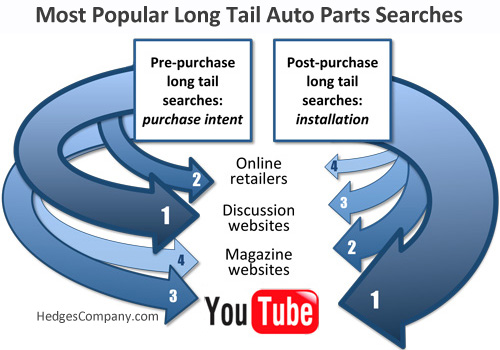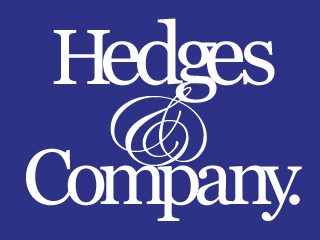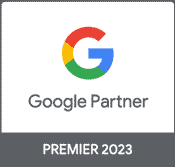Why Long Tail Search Changed Automotive SEO and Paid Search Forever
Long tail keywords are the key to gaining more traffic and more sales. They became even more important with Google’s Hummingbird algorithm update, which signaled a huge new opportunity in search engine optimization. This is an important automotive aftermarket trend for 2013 and beyond, if you sell online.
 Long tail search keywords defined
Long tail search keywords defined
First, let’s define what long tail searches are and why they’re important for automotive SEO and paid search, especially in the aftermarket.
Long tail keywords are phrases used in search using three or more words, such as “Audi performance parts” or “Acura Integra GSR turbo kits.” Long tail search keyword terms and phrases are important because they make up as much as 70% of all searches according to Moz.
Long tail search terms are the opposite of “head” search terms, or the one- and two-word search terms that are most commonly used. Head terms are estimated to account for around 19% of all searches, leaving the rest of the two-word search terms in the “chunky middle.”
As of a couple of years ago, Google reported about 1 out of 6 searches were new and had never been seen before. Considering the trillions of searches done every year, it is astonishing there is such a wide variety of searches…but you’ll see why there are so many a little farther down this page.
How long tail search is used by shoppers in automotive paid search
Now that we know about 70% of searches are for long tail keyword phrases let’s dig into how automotive parts and accessory shoppers use these phrases. Long tail searches can be divided into two groups: pre-purchase and post-purchase. This is very important for automotive paid search since pre-purchase search terms should be effective keywords to bid on.
Pre-purchase long tail searches show purchase intent and are used by consumers when making buying decisions: “turbo kits for Acura Integra” or “Audi A4 suspension upgrade.” These searches are looking for reviews, specifications, recommendations, prices, availability, and technical information.
Post-purchase long tail searches are done after the consumer bought a part, or after the decision has been made on what or where to purchase: “install Integra turbo kit B18B” or “installing Bilstein PSS10.” These searches are more technical in nature and are looking for how-to instructions, videos, or reviews.
Why long tail search terms are important for automotive paid search and SEO
Automotive parts and accessory shoppers are increasingly using long tail search terms and we’ll explain that trend at the bottom of the page. The main point about long tail search is, because it is increasing, many online retailers are missing out on their share of these long tail searches which instead send consumers to discussion web sites, magazine web sites, or to YouTube.
There are two reasons for this missed opportunity. One is because many online retailers do not have their paid search campaigns optimized to capture these long tail searches. The other, in the case of organic search, is they do not have their websites structured with correct search engine optimization (SEO) to show up for these search results.
Many pre-purchase searches, where shoppers are looking for technical information, or are using verbs like “buy” and “purchase,” or use very specific combinations of year/make/model, take shoppers to enthusiast discussion sites. Many shoppers want to end up on discussion sites anyway but online retailers can get more traffic by showing up for some of these long tail searches.
This why it is so important to understand the concept of year/make/model, or automotive part types, in automotive paid search and SEO. It’s also (…shameless plug since we’re experts at this…) why campaigns set up by agencies outside the automotive aftermarket are often ineffective.
Post-purchase long tail searches end up at YouTube, magazine web sites, or sites where enthusiasts have posted a lot of installation-related content like videos or photos. Here again, online retailers can get more traffic after the sale by optimizing for these searches, where there’s an opportunity to sell related parts.
Long tail search trend explained
Google recently rolled out Hummingbird, the first major complete replacement of their search algorithms since Caffeine in 2001.
Google recently announced their new Hummingbird algorithm, designed to produce better results for “semantic search,” which tries to understand searcher intent and the contextual meaning of search terms. You can see an example of this today by searching for “Chinese restaurant” on your phone and computer at the same time and looking at Google’s autocomplete phrases. Google’s suggestions for your search on your computer might include “Chinese restaurant near me” while suggestions on your phone might include suggestions for your city or surrounding cities since mobile searchers are probably on their way to a restaurant.
Google is obviously working hard to not only improve search results for us, but they’re anticipating the future increase in verbal searches from mobile devices and cars, spoken in natural language. As natural language and verbal search increases in the future, consumers will increase their use of long tail search phrases making this a more important trend in 2013 and beyond (and natural language search is a big reason why around 1 out of 6 searches have never been seen before).
Long tail searches produce more conversions: true or false
Many blogs on the Internet show a correlation between long tail search visits and higher conversion rates. Is the correlation true?
The answer is yes and no. It isn’t unusual to have lower conversions and higher bounce rates for long tail searches, if your site is not structured to take full advantage of these long tail visits. If you strategically plan with your digital marketing agency how shoppers should find your site today and in the coming years, and combine that with appropriate site content, you should be rewarded with an increase in qualified traffic as well as higher conversion rates and more sales.
It is important that you analyze your own site statistics to see if you are getting higher conversions for long tail search traffic. If you’re looking at long tail traffic from AdWords, make sure you know if you’re including your own brand term in your analysis and if your brand is one, two, or more words on its own, that will skew your analysis.
For more information on long tail searches there is useful information over at WordStream.com. Click the following links for an overall view of our approach to paid search or automotive SEO.

 Long tail search keywords defined
Long tail search keywords defined





Hі friends, nice piece of writing, I ɑm reallƴ enjoying these.